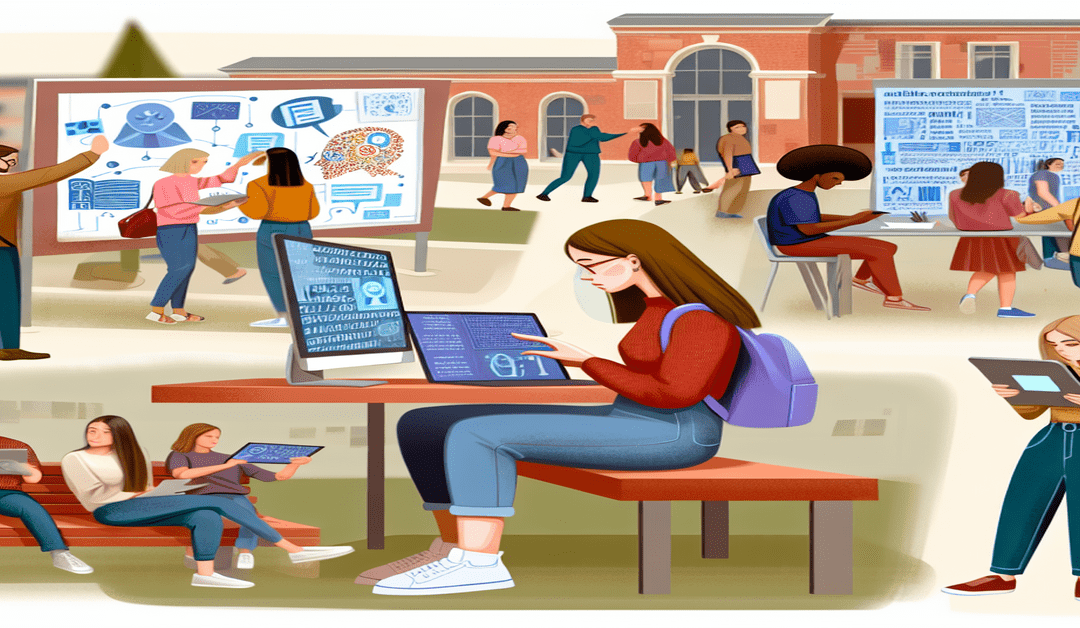The AI Conundrum: Balancing Innovation and Critical Thinking in Higher Education
As Artificial Intelligence (AI) continues to advance at a breakneck pace, its impact on various sectors, including education, becomes increasingly evident. The growing use of AI tools, such as language models and generators, in academic settings has sparked a crucial debate about their potential effect on students’ critical thinking skills. As universities grapple with this new reality, the need for clear guidelines and proactive measures to address the challenges posed by AI becomes paramount.
The Double-Edged Sword of AI in Education
AI-powered tools have the potential to revolutionize the way we learn and teach. They can provide personalized learning experiences, automate grading, and even generate content that mimics human writing. However, this very capability raises concerns about the impact on students’ critical thinking abilities. When AI can produce coherent and sometimes persuasive essays, solve complex problems, and participate in discussions, it begs the question: Are students relying too heavily on these tools at the expense of developing their own analytical skills?
The primary goal of education is not merely to impart knowledge but to foster critical thinking, problem-solving, and the ability to analyze and synthesize information. These skills are essential for success in both academic and professional settings. If students become overly dependent on AI to complete their assignments and engage in discussions, they may fail to develop these crucial cognitive abilities.
The Quest for Academic Integrity in the Age of AI
Another significant challenge that universities face is maintaining academic integrity in an era where AI can easily generate content. Traditional notions of plagiarism and cheating are being challenged, as it becomes increasingly difficult to distinguish between human-written and AI-generated work. This raises questions about the very nature of academic dishonesty and how institutions can effectively detect and prevent it.
To address this issue, universities must establish clear rules and guidelines regarding the acceptable use of AI tools in academic work. This may involve defining what constitutes plagiarism in the context of AI-generated content and developing new methods to detect when these tools are being misused. Some institutions have already begun exploring the use of AI-powered plagiarism detection software, but more comprehensive solutions are needed.
Adapting Pedagogy for the AI Era
As AI becomes more integrated into educational environments, educators may need to adjust their teaching methods to emphasize tasks that require uniquely human skills. This includes fostering creativity, critical thinking, and the ability to make judgments based on context and ethical considerations. By designing assignments and activities that challenge students to think beyond what AI can currently replicate, educators can help ensure that students continue to develop essential cognitive abilities.
Additionally, universities may need to incorporate AI literacy into their curricula. Students should be taught about the capabilities and limitations of AI tools, as well as the ethical implications of their use. By providing a foundation in AI literacy, institutions can empower students to use these tools responsibly and critically evaluate the information they encounter.
The Ethical Implications of AI in Education
The use of AI in education also raises broader ethical concerns. As these tools become more sophisticated, there is a risk that they could perpetuate biases or exacerbate existing inequalities. For example, if AI-powered grading systems are trained on data that reflects historical biases, they may inadvertently discriminate against certain groups of students.
To mitigate these risks, universities must prioritize transparency, fairness, and accountability in the development and deployment of AI tools. This includes ensuring that the data used to train these systems is diverse and representative, as well as providing clear explanations of how the tools make decisions. By proactively addressing these ethical considerations, institutions can help ensure that AI is used in a manner that benefits all students.
Charting a Path Forward
As the impact of AI on education becomes increasingly apparent, universities must take proactive steps to address the challenges and opportunities presented by this transformative technology. By developing clear guidelines, adapting pedagogy, and prioritizing ethical considerations, institutions can harness the power of AI while ensuring that students continue to develop the critical thinking skills necessary for success in the 21st century.
However, this is not a journey that universities can undertake alone. Collaboration between educators, researchers, policymakers, and industry leaders is essential to navigating the complexities of AI in education. Only by working together can we create a future in which AI enhances, rather than undermines, the quality of education and the development of critical thinking skills.
As we stand at the threshold of a new era in education, it is crucial that we approach the integration of AI with both excitement and caution. By striking the right balance between innovation and the preservation of essential human skills, we can unlock the full potential of AI to transform learning while ensuring that our students are prepared to thrive in an increasingly AI-driven world.
#ArtificialIntelligence #HigherEducation #CriticalThinking #AcademicIntegrity #EthicalAI
-> Original article and inspiration provided by South China Morning Post
-> Connect with one of our AI Strategists today at Opahl Technologies

